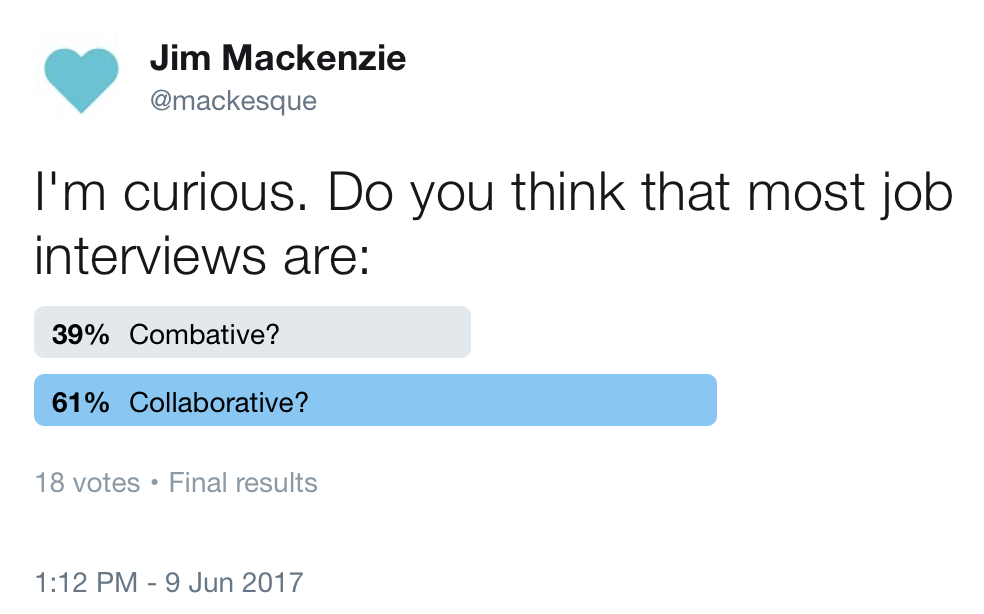Interviewing for a new job is so nerve-wracking. The adrenaline kicks in, and you are trying so hard to keep it under control. Trying to deliver the polished answers you prepared and rehearsed over and over. Hoping that you don’t slip up, or get tongue-tied. There’s the weight of an entire future sitting on your shoulders while you try to parse the questions.
Then there are the interviews where you get the feeling that the interviewer is trying to trip you up. I’ve had them in the past, but couldn’t be sure if I was imagining things. Did other people find interviews combative?
As we thought about how we would approaching hiring a new support programmer, we hit the books to find out.
Don’t expect to eat at lunch.
Though a company like Lending Club claims that lunch is a time for candidates to take a breather and relax, don’t. Your interviewers care about whether you are socially skilled and easy to be around…
…Lierman recommends that you pack a small water bottle and snack in your bag which you can nibble when you excuse yourself to go to the restroom.
There’s something fundamentally broken about a hiring process that inspires bathroom snacks as career advice. Articles like Nikki Brown’s dissection of “best-in-show” hiring processes weighed heavily. As a remote company, we can avoid the barbarism of the coffee shop interview, but how could we do better? What could we do to set up a candidate for success?
Flipping the script
So, we tried a little experiment. We set up interviews with our shortlisted candidates as usual. A few hours before the scheduled start time, I sent out the following email:
I’m looking forward to chatting with you later. Before we start, I thought I’d say hello and let you know that you’ll be chatting with Justin White and myself. I’ll invite you to the call at noon Chicago time. If you’d prefer to do audio only, that’s totally fine, same if you’d like to use video. Whatever makes it more comfortable for you.
We’ve got about an hour to get to know each other, and I was thinking it might be nice to start with any questions you have, then move on to ours. This is a collaborative chat — we want you to succeed, and it’s the start of working together. That might last for an hour or 5 years, or the rest of your career, but it starts here. Should be fun!
The big change was to flip the natural order of the interview, to start off with the candidate’s questions for us. They could get to know us, settle into the conversation and get comfortable before we asked ours. We wanted to set the stage, so that they could show us their best self. The best way to do that was to turn over the keys, and let them take the wheel.
The rest of the email reinforced that aim. From letting them know who they’d be chatting with, to giving them the time in their local timezone. Giving them control over how we would do the chat, to stressing that this is where their time at Basecamp starts. Acknowledging that this should be enjoyable, and setting them up to win.
We had some great conversations with all our shortlisted candidates. Relaxed, confident and in control, they gave a great account of themselves. Because we recognise that interviews are stressful, we took a more compassionate approach. That led us to a place where every one of our finalists gave their best shot, and some tremendous interviews. They were the most fun I’ve ever had on either side of the interviewing table. We made a great hire, and Rosa started her Basecamp career with our support, right from the very first minute of her interview. Now we get to keep that promise, every day.
Could you try flipping the script in your next set of interviews? What ideas do you have to build an even more collaborative approach? A little unscientific survey shows that we’ve got a way to go:
Can you help change those results? I’d love to hear your ideas.


